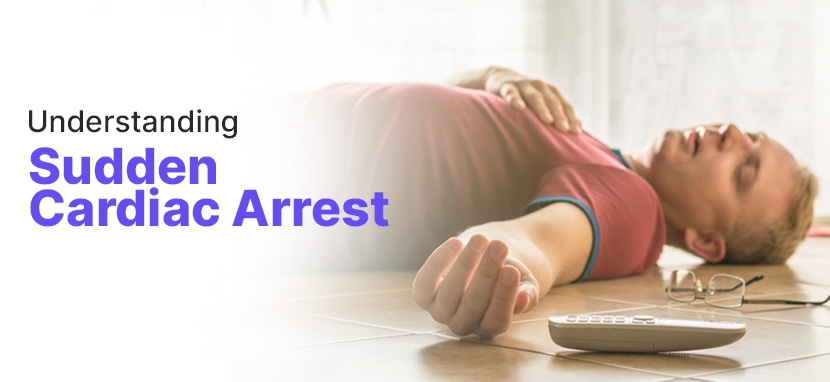
UNDERSTANDING SUDDEN CARDIAC ARREST
Sudden Cardiac Arrest (SCA) is a serious medical emergency that can strike anyone, anywhere, at any time. It's a frighteningly swift event where the heart suddenly stops beating, leading to a cessation of blood flow to vital organs. Let’s get an overview of SCA, including its prevalence, causes, risk factors, complications, life-saving measures, and preventive strategies.
What is Sudden Cardiac Arrest (SCA)?
Sudden Cardiac Arrest occurs when the heart's electrical system malfunctions, causing an irregular heartbeat (arrhythmia). This irregularity disrupts the heart's pumping action, leading it to quiver ineffectively (ventricular fibrillation) or stop altogether. Without prompt intervention, SCA is fatal within minutes1.
How common is SCA?
SCA is more prevalent than commonly thought, claiming hundreds of thousands of lives globally each year. It can affect individuals of any age, race, or gender, often striking seemingly healthy individuals without warning.
What happens right before SCA?
In many cases, SCA occurs without prior symptoms or warning signs. However, some individuals may experience warning symptoms such as chest pain, shortness of breath, palpitations, dizziness, or fainting spells (syncope) moments before the event.
What causes SCA?
SCA can be triggered by various factors, including underlying heart conditions such as coronary artery disease, heart muscle abnormalities, valve disorders, congenital heart defects, and electrolyte imbalances1.
What are the risk factors of SCA?
Several factors increase the risk of SCA, including a history of heart disease, previous heart attacks, family history of SCA or sudden death, smoking, high blood pressure, high cholesterol, diabetes, obesity, sedentary lifestyle, excessive alcohol consumption, and illicit drug use1.
What complications arise after SCA?
Survivors of SCA may experience various complications, including neurological deficits due to oxygen deprivation to the brain, heart muscle damage, recurrent arrhythmias, heart failure, and psychological trauma. Prompt medical care and rehabilitation are crucial for minimizing long-term complications1.
How to save a life during SCA?
Immediate intervention is vital to improve the chances of survival during SCA. The primary goal is to restore normal heart rhythm through cardiopulmonary resuscitation (CPR) and defibrillation using an automated external defibrillator (AED). CPR helps maintain blood flow to vital organs, while AED delivers an electric shock to restore normal heart rhythm2.
How to prevent SCA?
While SCA cannot always be predicted or prevented, adopting a heart-healthy lifestyle can significantly reduce the risk. Strategies for prevention include:
- Regular Exercise: Engage in moderate-intensity aerobic exercise for at least 150 minutes per week2, as recommended by your Doctor.
- Healthy Diet: Maintain a balanced diet rich in fruits, vegetables, whole grains, lean proteins, and healthy fats while limiting sodium, saturated fats, and added sugars2.
- Smoking Cessation: Quit smoking and avoid exposure to secondhand smoke, as smoking is a major risk factor for heart disease and SCA2.
- Manage Stress: Practice stress-reduction techniques such as meditation, yoga, deep breathing exercises, or hobbies to lower stress levels2.
- Regular Health Check-ups: Schedule regular medical check-ups to monitor blood pressure, cholesterol levels, and overall heart health2.
- Know Your Family History: Be aware of any family history of heart disease or SCA, as genetics can play a significant role2.
- Learn CPR and AED Use: Enable your family and surrounding community to save life during SCA. Enroll in CPR and AED training courses to equip people with life-saving skills and confidence in emergency situations.
Sudden Cardiac Arrest is a life-threatening condition that requires swift action for optimal outcomes. By understanding its causes, risk factors, and preventive measures, we can take proactive steps to protect ourselves and others from this silent killer. Remember, every second counts during SCA, so being prepared and knowledgeable can make all the difference between life and death.
1.Cardiac Arrest: Resuscitation and Reperfusion by Kaustubha D. Patil, Department of Medicine, Division of Cardiology, Johns Hopkins University, Baltimore, MD (K.D.P., H.R.H.); Henry R. Halperin, Department of Medicine, Division of Cardiology, Johns Hopkins University, Baltimore, MD (K.D.P., H.R.H.); Lance B. Becker, Department of Medicine, Division of Cardiology, Johns Hopkins University, Baltimore, MD (K.D.P., H.R.H.)
https://www.ahajournals.org/doi/10.1161/CIRCRESAHA.116.304495
2.Cardiac Arrest by Kevin Patel, Western Michigan University and John E. Hipskind, Kaweah Health. https://www.ncbi.nlm.nih.gov/books/NBK534866/
